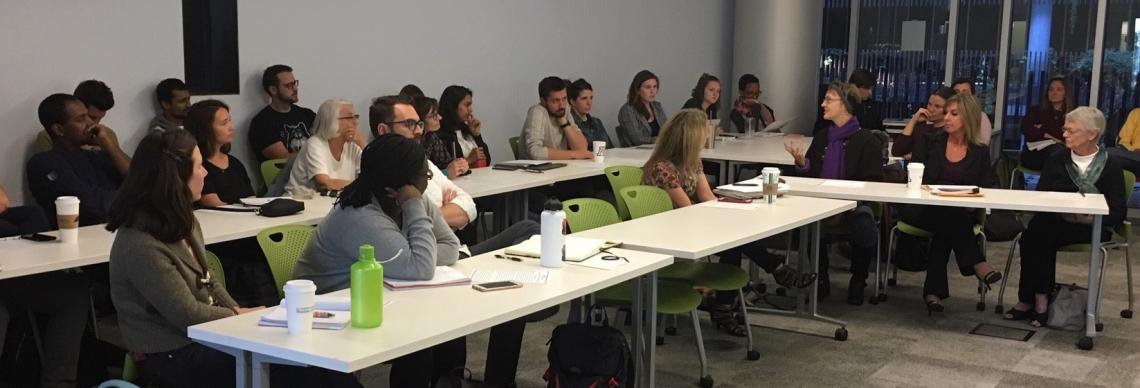Building a Career as a Development Practitioner: Advice from the Field
The Master's in Development Practice (MDP) Program is grateful to the five outstanding development practitioners who shared their insights "from the field" at a panel discussion on November 28, 2018. Some of the insights and advice from the panelists are provided here.

Kristina Bishop
Senior Gender Advisor and Global Health Fellow, USAID (also former MDP director)
“Building a career as a development practitioner is not always a linear process; for me, it was a series of happy coincidences. I started off in Peace Corps, like many of the newest cohort of MDP students…. Career building varies. The first step is getting your foot in the door; it took me 20 years to get to where I am now.”
Some recommended career skills: analyzing data; understanding spreadsheets and basing recommendations off data; writing well and concisely; writing in a way that is definitive, actionable, specific, and with particular outcomes at the end.
Albert Casella
Research Program Manager, Johns Hopkins Bloomberg School of Public Health & MDP alum)
“Connections made in the MDP Program and at the university helped get me get where I am now. The field is not as siloed as it was in the past and requires practitioners to have thorough knowledge across subjects…. [Build a] strong network -- relationship cultivation is important.”
Some recommended career skills: data visualization, which helps communicate key points; grantwriting, since you will be involved with grants this regardless of what role you have; research translation -- being able to explain a complex issue simply and concisely.
Monica Mueller
Senior Technical Advisor, TANGO International
“The path is serendipitous and also relies on connections. There is a real range of roles in international agencies that you would not necessarily think of, such as in human resources, communications, and knowledge management. The more open you are to these experiences, the more successful you will be.”
Some recommended career skills: writing concisely and for the target audience; understanding and interpreting statistical data; budgeting; cultivating calm and bringing your own balance to stressful situations.
Sylvie Morel-Seytoux
President and Founder, International Development, Research & Evaluation Consulting
“Be open, there are more opportunities outside of narrow specializations. [However, it’s essential] to have to have a master’s degree to do international work...After 25 years in this field, I think the US isn’t that different from other countries, we have same problems here."
Some recommended career skills: foreign languages come in handy a lot -- even conversational language skills can give you some advantage; research and writing is key, as always being aware of your audience.
Nancy Bissell
Co-founder, The Primavera Foundation: Pathway out of Poverty
“You have to be light on your feet and responsive. Be attuned to what a community needs… [Try to] be as responsive as possible to people above and below. It’s important to learn the skills of critical thinking. There’s also no substitute for doing the ‘hard work’ of research.”
Some recommended career skills: follow your passion – if you love a certain country or culture, find a way to make that work for you; understand the rapidly changing needs of society.
Resources for Careers in Development
- Article: "Is a master's degree in international development for you?"
- Devex: The Media Platform for the Global Development Community
- ReliefWeb: Informing Humanitarians Worldwide
- DevNetJobs: International Consulting Jobs and Consulting Opportunities
- UN Jobs: Vacancies with the UN and other International Organizations
- Global Women's Institute | The George Washington University
- UN Young Professionals Program
- US Department of State Foreign Service Officers
- Idealist: Find the Perfect Opportunity to Change the World
- CRS International Development Fellows Program
- Food Security and Nutrition Network

